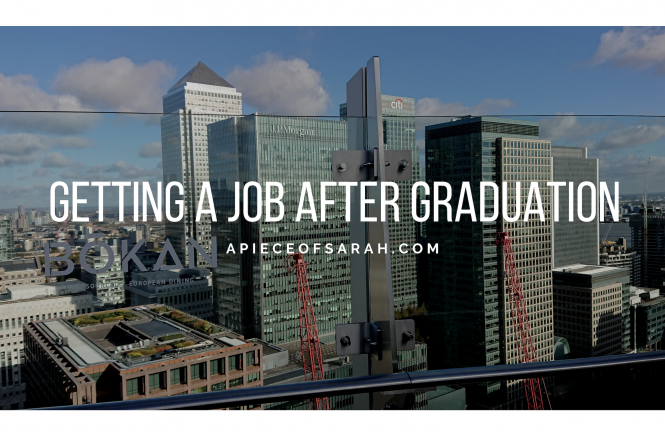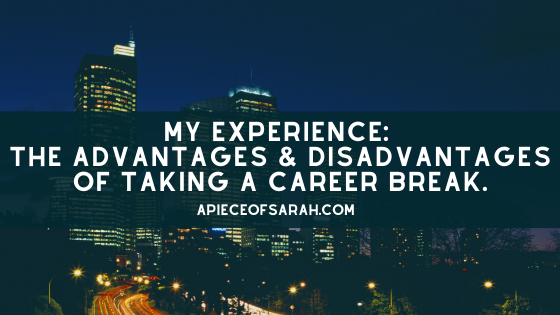To kick off Sarah’s Job series (#sarahsjobseries), I will give you tips on finding a job after graduation as well as giving you tips about working full time.
So, what do you do after you graduate? Most people have three options, travel around the world because they were smart enough to save their student loan, do a masters or find a job.
If you’re like me, you chose to find a job, congrats!
Before you look for a job, create a career plan and decide:
- What type of job do you want?
- What industry do you want to go into?
- What is your long-term career goal?
- What do you want to achieve?
- How long you want to stay in your current workplace?
- When you want to be promoted and if you want to do a chartered qualification?
- How far do you want to work from home?
Do you want to be a CFO (Chief Financial Officer), CTO (Chief Technology Officer), CEO (Chief Executive Officer) or make enough money when working full time work to become a blogger, photographer or sports coach full time?
Search for jobs that fit into your career plan, doing other roles will distract and divert you from your plan in the long term. However, there may be some great opportunities out there that don’t fit into your plan, weigh up the pros and cons then decide which is best for you. Most graduate jobs require experience, this can be from part-time jobs, summer internships and placement years. You’re more likely to get the job if you have industry experience although this is not always possible. Experience is important because you gain transferable skills such as teamwork, communication, self-motivation, analysis, diffusing conflict and organization skills. If you don’t have experience in your field, you MUST highlight the transferable skills you gained from part-time work and Uni. My favourite transferable skills to mention that are not industry related are my organization and teamwork skills gained from group work, finding time to study and working part-time whilst at university.
I’M NOT DOING A MASTERS, WHY DO I NEED ANOTHER QUALIFICATION?
Your job may require you to study for a professional qualification, these are vocational training courses that relate to a specific industry or career path, and this includes:
- Association of Chartered Certified Accountants (ACCA) – Accounting
- BCS -The Chartered Institute for IT – IT
- Chartered Institute of Management Accountants (CIMA) – Accounting
- Chartered Institute of Personnel and Development (CIPD) – HR
- Chartered Insurance Institute (CII) – Insurance
- Institution of Civil Engineers (ICE) – Civil Engineers
- Royal Institution of Chartered Surveyors (RICS) – Surveyors
After completing the course, you achieve chartered status, meaning you can demand more money, yay. In all seriousness, chartered qualifications are important because they can increase your lifetime earnings significantly, in addition, you have a qualification that others don’t have, you gain new skills which will aid in your personal development and broaden your career opportunities. My suggestion is to visit Prospects for a more extensive list of chartered qualifications visit www.prospects.ac.uk/postgraduate-study/professional-qualifications
If you plan on doing a professional qualification, then find a job that will provide study support this usually means you have to stay at the company for a few years or you’ll have to pay them back for some or all of the study support. This is called a clawback and should be stipulated in your contract. I strongly believe after paying such an extortionate amount for university, you should make sure you find a job willing to invest in you by providing study support. When I looked for my graduate job I made sure my job was providing study support for my CIMA qualification and I did not accept or apply to any jobs that were not providing it because I know my worth and career goal is to be a chartered accountant first, before anything else.
Lastly, decide how far you want to work from home. Are you willing to travel 2 hours to work? That’s 4 hours daily, is this really what you want? I did it for a year and I can tell you now, it’s not what you want.
IF YOU DON’T KNOW WHAT YOU WANT TO BE OR WHAT INDUSTRY YOU WANT, TRY TO FIGURE OUT:
- What your passions are?
- What you’re good at?
- What environment you think you’ll enjoy working in and go from there?
I recommend GE’s career test: https://gecareers.traitify.com, I completed it and thought it was very accurate with a role that suits my skills and personality.
Even after creating a career plan and completing the test you may not find the perfect job for you, you might find something you’re good enough and stick to it and that’s OK. I feel like so many of us think if a profession doesn’t match us perfectly, it’s not for us and I don’t think that’s the case.
Before I applied for my current job I prayed over it with ‘By Faith, I Receive My God-Given Job’ by Pastor Veronica Anusionwu (Founder Of The Lord’s Words On Healing Ministries: http://lwhhealingcentre.com/prayers-for-those-looking-for-a-job/ ). I thoroughly recommend this book, Pastor Veronica is a remarkable pastor and author and I’ve been blessed with my current job due to the prayers and so has one of my friends. Prayer works, invest in yourself and buy the book.
FINDING A JOB
The job market is disgustingly competitive. Unless you have previous experience in the field you want to go into don’t be upset if you don’t get handed a job once you walk off the podium at graduation.
To give yourself the best chance of securing a great graduate job you must send several applications out, which is tedious because you must rewrite information that is already in your CV into boxes, do numerical, verbal/non-verbal, logical, situational and psychometric tests, attend assessment centres and do multiple interviews for one post. Although it’s time consuming, once you get the job it will be really rewarding.
When trying to find a job you can use the below job sites, sign up to recruitment agencies and check out company careers pages:
- Indeed: indeed.co.uk
- Target jobs: targetjobs.co.uk
- Monster: monster.co.uk
- Total jobs: totaljobs.com
- Reed: reed.co.uk
- Prospects: prospects.ac.uk
When trying to practice for verbal, numerical psychometric tests use assessmentday.com and practiceaptitudetests.com
Many people do not get a job within the first year they graduate because the market is that competitive, when I went to assessment centres before I found my current job there were many people who finished their masters or bachelors the previous year and were still unemployed.
When I graduated, I signed up to many recruitment agencies, but the one that stood out to me is Robert Walters (robertwalters.co.uk), they sent me loads of job posts and called me to discuss posts, although I did not get my current post through them, I still recommend them because of how professional they were.
NETWORK
Go to graduate job fairs and networking events, there are so many companies to see and many people to network with. You never know what opportunities may arise.
GLASSDOOR AND PAYSCALE
When looking for a job, check Glassdoor.com for reviews on the company, I refused to apply for jobs that were less than 3 out of 5 because that means staff were miserable and I refuse to be unhappy at a place I spend most of my day at. Additionally, check the average salary for people in your field at payscale.com to make sure you’re not underselling yourself. If a company wants great talent, they should be willing to pay for it.
FRAUDULENT JOB POSTS
When looking for jobs be vigilant for fraudulent jobs advertisements and emails because fraudsters will take any opportunity to prey people. If you see a job that’s too good to be true, it might not actually be and any job that wants you to pay for a ‘qualification’ or ‘check’ before you get the job is likely to be fraudulent so be alert. Be wary of jobs that don’t even address you by your name. When I was looking for a job, I randomly received this email:
“Dear Candidate,
After careful consideration you have been selected for our Sales and Customer Service Role with XYZ Organisation. My manager would like to meet with you to discuss the role further. I know this is very last minute but unfortunately we are wrapping up the recruitment process therefore we would like to schedule you in for the following appointment:
Appointment Time/Date: Thursday 27th of July at 3.15pm OR Thursday 27th of July at 3:45pm
Location: London
Meeting with: The Apparent CEO of the company
Please reply promptly with your name to confirm your preferred appointment time and the appointment will be confirmed automatically. If you are not available for the above dates please contact our office and ask for the recruiter who couldn’t even put my name in the email.
The appointment is scheduled to last approximately 30 minutes. Please ensure that you attend in Smart casual (NO blue jeans or trainers) and bring a copy of your most updated CV if you can.”
- My name is not “Candidate”
- Who told you I wanted the job?
- How do you know I am free that day?
- How can you give me two appointment slots on the same day and tell me to choose?
- If I have been selected for a role, why do you need my latest CV? Shouldn’t you have this already?
- Why are you telling me what to wear when you don’t even know my name?
The list goes on, If a job is addressing you as “Dear Candidate” and offering you a job role without seeing your CV, block them. It’s a scam. (Unless someone you know recommended you, but you would have knowledge of that anyway)
STAY TRUE TO YOURSELF
When looking for a job, stay true to yourself. There’s no point applying for a company you don’t believe in or won’t be comfortable at. When I was looking for a graduate job, I was asked if I was interested in being put forward for a role as a Finance Analyst at The Daily Mail. I politely declined for obvious reasons. If you know in your heart that a job won’t be right for you because the company has a history of being unethical, don’t apply. You don’t need unnecessary stress in your life.
INTERVIEWS
Go into your interviews with confidence and research the company thoroughly, e.g. know what the company does, who is in their executive team, when it was formed, any major press releases they have had in the last 3 months (have they merged with another company) and what will be expected of you. Check glass door for questions they have asked in previous interviews and then prepare answers that show your experience.
Interviews are a two-way street, not only are the employer deciding if you’re suitable for the position, you get to decide if the company is suitable for you, also, if you like the people there and if you can see yourself progressing there. I had several interviews at a firm but one of the interviewers was so rude that I just couldn’t see myself working there so when I didn’t get the job I was fine about It and the job I ended up getting paid more so it was a blessing. No one should be miserable at work.
REJECTION
Rejections hurt. You may think an interview or even application went well and days/weeks, even months go past, and you receive the below responses which hurt, especially if it’s a job you wanted:
“We’re sorry to inform you”
“Unfortunately, we have decided to”
“We received a large number of applications and…”
The list goes on and you may not even receive a rejection email at all.
SELF-PITY is allowed for a short period of time, but you can’t wallow in your own sadness for days because life will keep going even when you’re not so don’t panic and keep trying. Job hunting is time consuming and rejections hurt, but every rejection leads to an opportunity. Hopefully, you won’t receive any more rejections.
TIPS AFTER FINDING A JOB
Huzzah, after fighting tooth and nail you’ve hopefully found the job for you.
Full time work is different, but you can meet some great people at work and you receive a lot of responsibility which will allow you to grow in your career and as a person. However, it can be stressful, you may have to get on the tube every day, you must meet your deadlines, targets and organizational goals and you may not actually like the people you work with. It’s sad, but it happens.
Meeting company targets is extremely important so work hard and prioritize the most important task and finish that first. If you realize you don’t like your colleagues, its ok, keep yourself to yourself and remember you get paid to work, so work hard, and then go home. You only have to deal with them at work. If you want to get to know your colleagues more, go to social events and talk to new people, I have friends in different departments at work which I like because everyone is different.
DOCUMENT EVERYTHING
Keep everything in writing, I hate to say this, but people lack accountability and will be willing to throw you under the bus to make themselves look better and absolve all responsibility from themselves, so make sure you follow up with email confirmations clarifying things that you can use as evidence in the future.
Document what you do at work, everyone thinks they will remember what they do day in day out, you won’t, so write it down, then you can use the evidence of what you’ve achieved when negotiating your salary.
SOCIAL MEDIA
Be wary of adding your colleagues on social media, if you know there’s things you’re doing online that you don’t want them to see then don’t add them on Instagram, snapchat or twitter. You may think you’re great friends with your colleagues, but are you really? If you call in sick because you went out the previous night how do you know your colleague won’t mention it, whether intentionally or non-intentionally because they have you on snapchat? Keep your business and personal life separated, it will save you a lot of headache because prevention is better than cure.
If you decide to add your colleagues on social media do a social media purge e.g. on twitter, search your @ with offensive and disrespectful key words and delete those tweets. We live in a ‘cancel’ culture where people will dig up your old tweets to find what they can use against you sometimes because you deserved it, other times because they don’t want to see you do well or they hate that you’ve changed from the person you once were. That’s the consequence of having a digital footprint, it’s there for everyone to see. Maybe your views have changed since then, maybe they haven’t, regardless delete what could be used against you or make your personal account private and create a professional account to have your colleagues on.
To conclude, getting a job after graduation can be hard work, but persevere and hopefully you find the right job for you with a great salary too.






12 Comments
Soo useful…for everyone from recent graduates, to those still looking for jobs or wanting to change career.
Very honest and necessary
Thanks, tried my best to be as honest as possible and tell people how hard finding a job after graduation is
Great tips on how to navigate professional life after you graduate.
Thanks! There’s a lot for people to think about
Frankly articulated and good write up.
After graduation then comes the hardest journey of finding the right job.
Frankly articulated and good write up.
After graduation then comes the hardest journey of finding the right job.
Great post Sarah! Lots of useful tips there.
Thanks Jem!
Appreciate the honesty because it is definitely not an easy ride, thank you for this Sarah!
It really isn’t! Thanks for reading Swin ❤️❤️